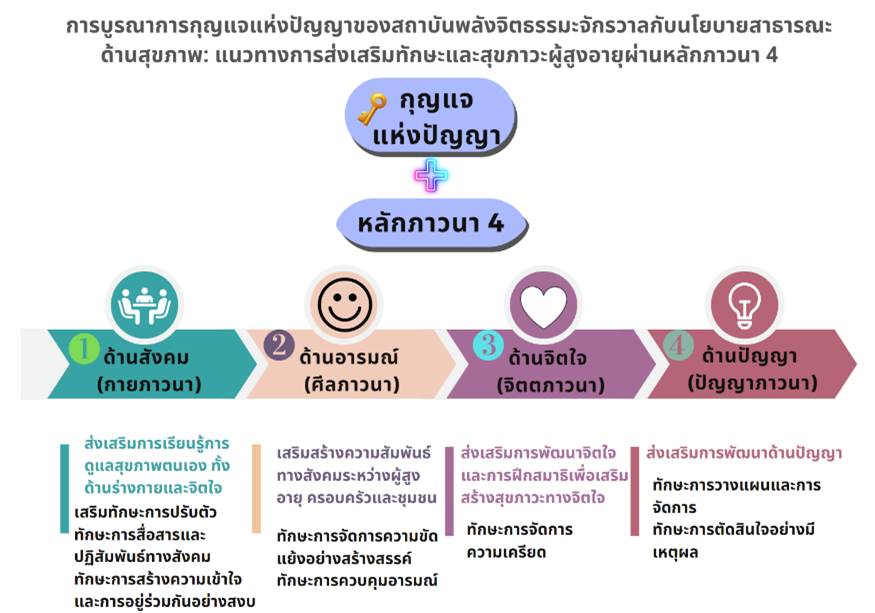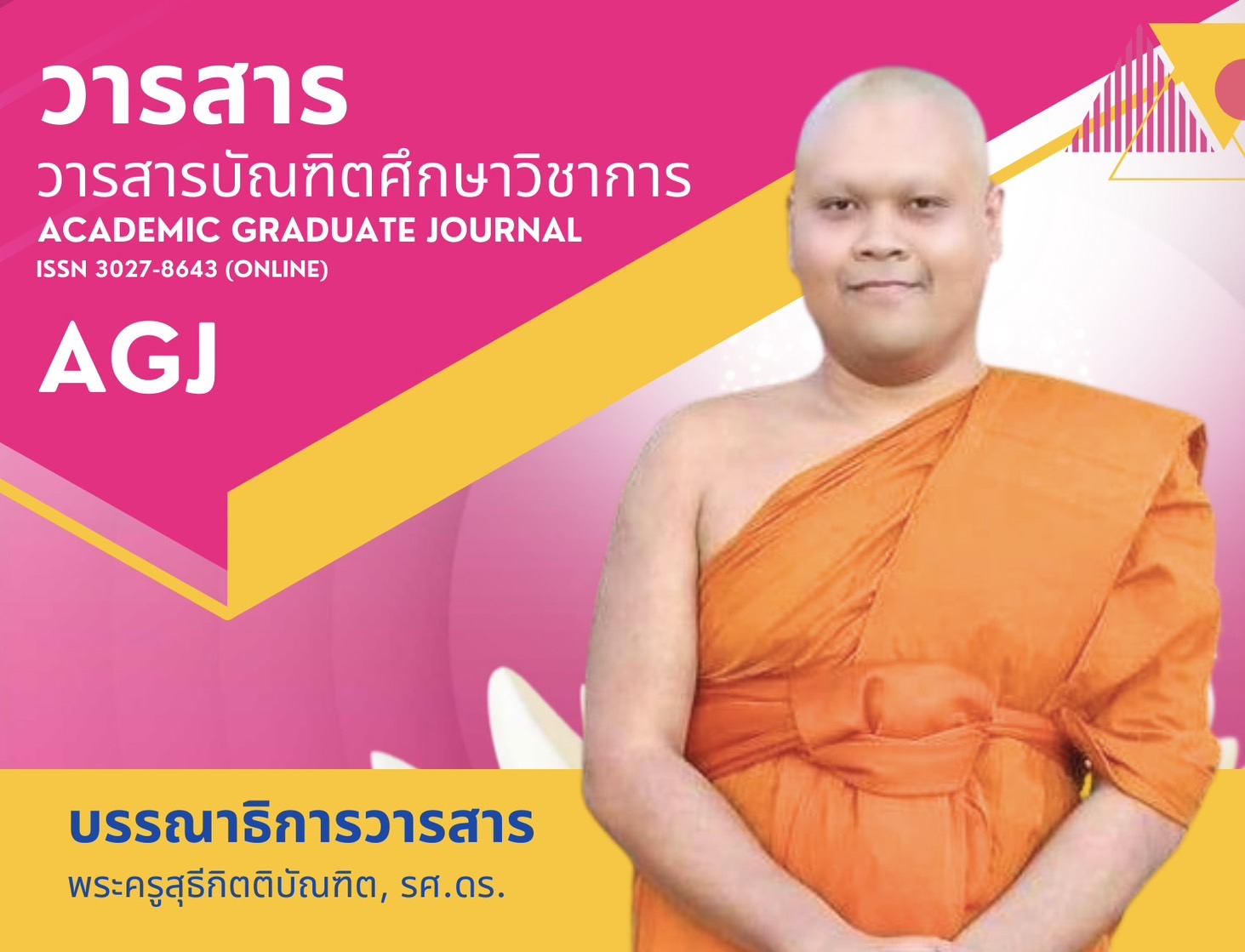THE INTEGRATION OF THE KEY TO INTELLECTUALS FROM THE PALANGJIT DHARMA JAKRAWARN INSTITUTE WITH PUBLIC HEALTH POLICY: A GUIDELINE FOR PROMOTING SKILLS AND WELL-BEING OF THE ELDERLY THROUGH THE BHAVANA 4
Keywords:
Nine Keys, Public Health Policy, Elderly Well-being, Bhavana 4Abstract
This academic article aims to study the integration of the Keys of Intellectual from the Palangjit Dharma Jakrawan Institute to enhance comprehensive and sustainable skills and holistic well-being of older people through the Four Aspects of Development (Bhavana 4). The study was conducted through research of documents, textbooks, articles, and information from online networks and media on the topic of approaches to promote the skills and well-being of older people. The results show that using the concept and principles of the Keys of Intellectual from the Palangjit Dharma Jakrawan Institute and the Four Aspects of Development can serve as a guideline for enhancing skills and well-being to promote the quality of life for older people. It consists of four aspects: 1. Social aspect (Kaya-Bhavana): Promotes learning about physical and mental health care by enhancing adaptation skills, communication and social interaction skills, and skills for building understanding and peaceful coexistence. 2. Emotional aspect (Sila-Bhavana): Promotes the creation of social relationships between older people, families, and communities by enhancing creative conflict management skills and emotional control skills. 3. Mental aspect (Citta-Bhavana): Promotes mental development and meditation practice to enhance mental well-being through stress management skills. 4. Intellectual aspects (Panna-Bhavana): Promotes intellectual development through planning and management skills and rational decision-making skills.
References
กรมกิจการผู้สูงอายุ. (2552). แผนผู้สูงอายุแห่งชาติ ฉบับที่ 2 (พ.ศ. 2545 -2564) ฉบับปรับปรุงครั้งที่ 1 พ.ศ. 2552. สืบค้น 12 กันยายน 2567, จาก http://www.dop.go.th
พุทธทาสภิกขุ. (2535). หลักธรรมเพื่อชีวิตที่ดี. กรุงเทพฯ: สำนักพิมพ์ธรรมสภา.
พรรณี วงศ์จำปาศรี.(2565). กระบวนการส่งเสริมสุขภาวะของผู้สูงอายุตามหลักพุทธธรรมในจังหวัดนครพนม.วารสารสถาบันวิจัยพิมลธรรม, 9(1), 27-38.
พระพรหมคุณาภรณ์ (ป.อ.ปยุตฺโต) (2544). พุทธธรรม (ฉบับเดิม) (พิมพ์ครั้งที่ 11). กรุงเทพฯ: ดวงแก้ว.
พระมหานิพนธ์ มหาธมฺมรกฺขิโต (แสงแก้ว). (2557). การพัฒนารูปแบบการดูแลสุขภาพผู้สูงอายุด้วยหลักจิตภาวนาในพระพุทธศาสนา (รายงานวิจัย). พระนครศรีอยุธยา: มหาวิทยาลัยมหาจุฬาลงกรณราชวิทยาลัย.
รศรินทร์ เกรย์ และคณะ.(2556). มโนทัศน์ใหม่ของนิยามผู้สูงอายุ : มุมมองเชิงจิตวิทยาสังคมและสุขภาพ. นครปฐม: สถาบันวิจัยประชากรและสังคม มหาวิทยาลัยมหิดล.
สุทธิพงศ์ บุญผดุง.(2554). การพัฒนาคุณภาพชีวิต ผู้สูงอายุในท้องถิ่นโดยใช้โรงเรียนเป็นฐานตาม หลักเศรษฐกิจพอเพียง (ระยะที่ 1) (รายงานวิจัย). กรุงเทพฯ: มหาวิทยาลัยราชภัฏสวนสุนันทา.
สำนักงานสถิติแห่งชาติ. (2564). รายงานประชากรผู้สูงอายุในประเทศไทย พ.ศ. 2564. กรุงเทพฯ: สำนักงานสถิติแห่งชาติ.
สถาบันพลังจิต ธรรมะ จักรวาล.(2550). การอบรมของสถาบันพลังจิต ธรรมะ จักรวาล เอกสารรวบรวมการอบรมของสถาบันพลังจิต ธรรมะ จักรวาล. นครปฐม: สถาบันพลังจิต ธรรมะ จักรวาล.
สมเด็จพระพุทธโฆษาจารย์ (ป.อ. ปยุตฺโต). (2561). พจนานุกรมพุทธศาสน์ ฉบับประมวลศัพท์ (พิมพ์ครั้งที่ 31). กรุงเทพฯ: โรงพิมพ์บริษัทสหธรรมิก จำกัด.
อมร รักษาสัตย์. (2520). การพัฒนานโยบาย. กรุงเทพฯ: สำนักพิมพ์สถาบันบัณฑิตพัฒนบริหารศาสตร์.
Dodge, R. et al. (2012). The challenge of Defining well-being. International Journal of Wellbeing, 2(3), 222-235.
Keyes, C. L. M. (1998). Social well-being. Social Psychology Quarterly, 61(2), 121-140.
Puchalski, C. M. et al. (2009). Improving the spiritual dimension of whole person care: Reaching national and international consensus. Journal of Palliative Medicine, 12(10), 885-904.
Punnanan, C. (2020). The Process of Seeking Nine-Keys Philosophy of Palangjit Dhamma Jakrawan Institute and Utilization for Human Development. Solid State Technology,63(2), 1998 - 2008.
Ryff, C.D., & Keyes, C.L.M. (1995). The structure of psychological well-being revisited. Journal of Personality and Social Psychology, 69(4), 719-727.
World Health Organization (WHO). (1948). Constitution of the World Health Organization. Geneva: World Health Organization. September 13, 2024, from https://www.who.int/tools/whoqol
World Health Organization. (2021). Global report on ageism. Retrieved September 13, 2024, from https://www.who.int/publications/i/item/978924001686







